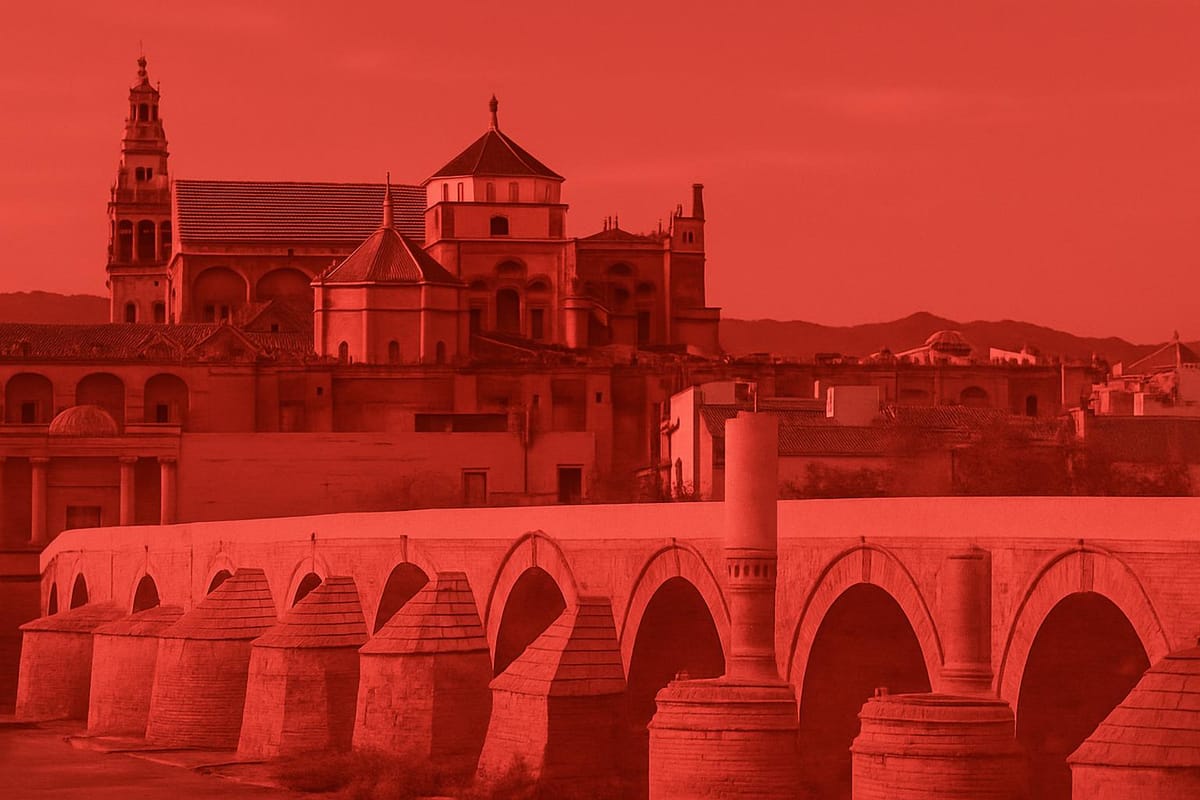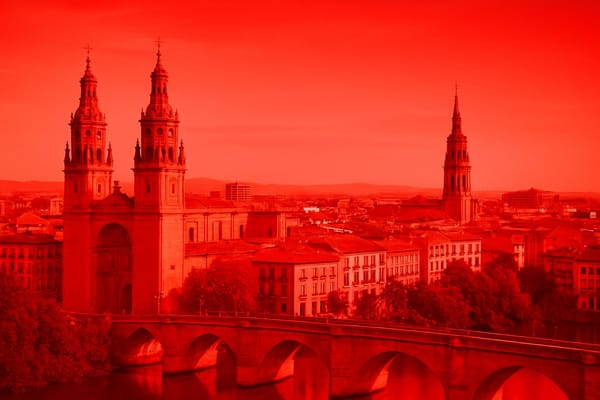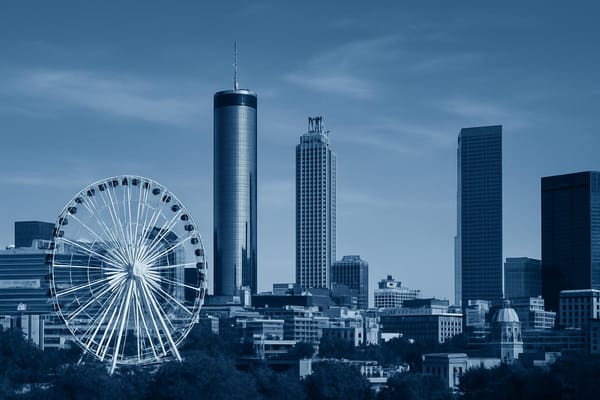Córdoba
Discover the Mezquita, historic Alcázar, Roman bridge, patios, flamenco and tapas in a UNESCO jewel.

Important things to know about Córdoba
Córdoba, Spain is a city of layered identity where Andalusian light softens whitewashed streets and a warm Mediterranean climate shapes daily rhythms; its urban fabric blends centuries of language, cuisine and communal life so that modern residents and visitors alike feel the pulse of culture in neighborhood markets, family-run bars and lively plazas. As the capital of a historic province, Córdoba balances tradition and contemporary living, with a local economy that mixes agriculture, education and small industry while universities and creative enterprises inject youthful energy and innovation into the city. Everyday scenes - from elders conversing over coffee to artisans preserving culinary and textile crafts - reveal how Spanish customs and local dialects coexist with international influences brought by students, professionals and expatriates. Gastronomy here is a social glue, where seasonal products and gastronomy traditions shape menus and home cooking, and where streets are animated by regular markets and neighborhood gatherings rather than staged tourist routes. The city's green spaces, riverfront promenades and tree-lined avenues offer pockets of calm for residents and contribute to urban biodiversity, while transportation links and modern services make Córdoba a practical base for living and working in southern Spain. Community festivals, music and contemporary arts scenes sustain an active calendar that strengthens social ties, and local efforts toward sustainability and heritage conservation reflect a civic pride in maintaining the city’s authenticity. In short, Córdoba presents a living, breathing urban tapestry: deeply rooted in history yet continually renewing itself as a dynamic Spanish city in the heart of Andalusia.
Sightseeing hot-spots in Córdoba
Córdoba in Spain is a treasure trove of history and architecture, and the sightseeing highlights of Córdoba begin with the incomparable Mezquita-Catedral. This monumental former Great Mosque blends Islamic arches and Christian chapels in a way that mesmerizes visitors, making it the city's premier attraction. Just a short stroll away, the iconic Roman Bridge spans the Guadalquivir River and offers timeless views of the old town and the Calahorra Tower. The entire historic center, designated UNESCO World Heritage, invites exploration along narrow streets where every corner reveals Moorish courtyards, carved stone, and centuries of layered history.
Beyond the Mezquita, the Alcázar de los Reyes Cristianos showcases fortified gardens, towers and mosaics that reflect Córdoba’s role during the Christian reconquest, while the adjacent Judería neighborhood preserves the atmosphere of medieval Jewish life with its cobbled alleys and the small synagogue that stands as one of the best-preserved in Spain. In spring, the city’s Patios burst into color during the famous Patio Festival, when private courtyards open to the public and reveal spectacular floral displays. Walking through these intimate spaces is a sensory highlight that complements the grand monuments and deepens understanding of Córdoba’s unique cultural fusion.
Culinary and cultural experiences further enhance sightseeing in Córdoba: savoring local tapas, tasting salmorejo and flamenquín, and catching an impromptu flamenco performance in a tavern create memorable evenings. The city's moderate size makes it ideal for relaxed exploration on foot, with plenty of photographic vantage points from the bridge and riverbank. Whether your focus is architecture, history, or local life, the sightseeing highlights of Córdoba offer a compact but richly layered journey through Andalusia’s most evocative urban landscape.
Hotels to enjoy in Córdoba
Córdoba, Spain is a destination where hotels in Córdoba range from charming boutique hotels tucked into the historic center to larger modern properties near the train station and airport. Travelers seeking to visit the Mezquita, stroll the Roman Bridge or lose themselves in the narrow lanes of the Judería will find many options that emphasize local character, with whitewashed courtyards, flower-filled patios and traditional Andalusian décor. Whether you prefer a luxury stay with riverfront views and rooftop terraces or a budget-friendly pension with friendly staff and cozy rooms, Córdoba offers accommodations that suit romantic city breaks, family trips or business travel. The combination of cultural attractions and well-preserved historic neighborhoods makes staying in the city center particularly appealing for first-time visitors.
When comparing hotels in Córdoba, pay attention to amenities that matter most to your trip: included breakfast, air conditioning in summer, free Wi‑Fi, and convenient parking options if you plan to drive. Many properties highlight proximity to the Alcázar and other landmarks, making it easy to plan walking tours and evening flamenco experiences without long transfers. Booking early for high season and festival dates ensures better room selection and rates, while reading recent guest reviews helps confirm the hotel’s atmosphere, cleanliness and service standards. By choosing the right area-whether near the Mezquita for sightseeing or by the river for relaxed views-you can make the most of your stay in Córdoba, Spain and enjoy the authentic Andalusian hospitality the city is known for.
Restaurants to try in Córdoba
Córdoba is a city where the restaurants of Córdoba, Spain blend history and flavor, and every meal can feel like a small celebration of Andalusian culture. In the narrow streets of the historic centre and around the shadow of the Mezquita, traditional tapas bars sit beside contemporary kitchens that reinterpret Spanish cuisine with seasonal ingredients. Visitors seeking authentic tastes will find classics such as salmorejo, berenjenas con miel and flamenquín, while seafood and river-fresh dishes reflect the influence of the Mediterranean and the nearby Guadalquivir. Many Córdoba restaurants emphasize local olive oil, regional wines from Montilla-Moriles, and house-made sauces, creating a dining scene that appeals to both travelers hunting the best restaurants in Córdoba and locals who care about provenance and technique.
For those optimizing their travel plans or writing about gastronomy, Córdoba offers a spectrum from cozy family-run taverns to inventive fine dining, all within a walkable city that rewards culinary exploration. The charm of dining in Córdoba also lies in atmosphere: meals on sunlit terraces, in flower-filled patios, or under historic arches make eating out a sensory experience tied to place. Whether your focus is on finding affordable tapas in winding alleys or booking a chef-driven dinner that showcases modern Andalusian flavors, Córdoba restaurants deliver memorable plates, warm hospitality and a strong sense of regional identity that helps this city stand out on any foodie itinerary.
Best shopping stops in Córdoba
Córdoba is a delightful destination for shopping lovers exploring southern Spain, where the historic centre and winding lanes of the Judería hide an array of independent stores and ateliers. Strolling from the Mezquita toward the Calleja de las Flores, visitors encounter boutiques filled with artisan ceramics, hand-tooled leather goods, and intricate silver jewelry inspired by Andalusian motifs. The city's markets and small galleries offer authentic Córdoba souvenirs - from bottles of premium olive oil and jars of local preserves to embroidered shawls and handcrafted fans perfect for warm Andalusian afternoons. Antiques hunters will appreciate the flea stalls and family-run establishments that stock vintage tiles, carved wooden furniture, and rare postcards that recall Córdoba’s Moorish and Christian heritage, making shopping in Córdoba both culturally rich and uniquely rewarding.
For those seeking contemporary design, Córdoba’s independent designers and craft workshops create modern takes on traditional crafts, with minimalist ceramics and bespoke jewelry sold alongside centuries-old techniques. Seasonal patio fairs, artisan markets and pop-up shops in the old town spotlight young makers and flamenco accessory artisans, while gourmet food shops and wine merchants present the best of Andalusian gastronomy. Whether you're hunting for a meaningful keepsake from your visit to the Mezquita or sourcing quality olive oil and spices to recreate Spanish recipes at home, the variety and authenticity of Córdoba, Spain shopping make it a must-visit for travelers who value craftsmanship, tradition, and memorable retail experiences.
Nightlife highlights in Córdoba
Córdoba nightlife pulses with a charming blend of tradition and modern leisure, making Córdoba, Spain a must-visit after dark. In the historic Judería and around Plaza de la Corredera and the Alameda, cozy tapas bars and lively wine taverns line narrow streets where locals and visitors mingle until late. The illuminated Mezquita provides a stunning backdrop for evening strolls, while riverside terraces and hidden courtyards offer relaxed spots to sample local montilla-moriles wines and craft beers. Whether you seek a relaxed evening of gourmet bites or a bustling bar crawl, the variety of venues ensures the nightlife in Córdoba caters to every taste, from refined gastronomy to casual munching under warm lamplight.
When it comes to entertainment, flamenco is the soul of Córdoba nightlife: intimate tablaos and cultural centers host passionate performances that capture Andalusian spirit. For those looking for live music beyond flamenco, small jazz clubs and contemporary venues deliver eclectic sets and DJ nights, keeping late hours well into the morning. Festivals and weekend markets amplify the energy, turning plazas into open-air meeting points. To fully enjoy Córdoba nightlife, follow local rhythms-dinner often starts late and the best scenes build after 10 PM-so pace your evening and savor the blend of history, flavor, and music that defines this vibrant city.
Getting around in Córdoba
Córdoba, Spain, offers a practical airport and train situation that combines local accessibility with strong regional links: the city has a small Córdoba airport (ODB) serving general aviation and limited commercial flights, while the majority of international and frequent domestic travelers use nearby Seville and Málaga airports for more flight options and connections; by contrast, rail is a major strength for visitors and locals alike, with Córdoba Central acting as a key rail hub in Andalusia, served by Spain’s high-speed AVE network and regular regional trains that provide fast, comfortable train to Córdoba services from Madrid, Seville, Málaga and other important Spanish cities; this mix means most tourists arriving by air often connect through Seville or Málaga and then continue by rail, taking advantage of efficient timetables and central station access to the historic centre, while domestic travelers find competitive fares and frequent departures on both AVE and conventional routes-optimizing your travel plans for convenience and time savings when planning flights to Córdoba or choosing the best rail connections in southern Spain.
Culture must-see's in Córdoba
Córdoba in southern Spain is a living museum where the layered history of Romans, Muslims, Jews and Christians is visible in every street. The crown jewel is the Mezquita-Catedral, an awe-inspiring monument of horseshoe arches and a luminous mihrab that blends Islamic and Christian art; its forest of columns and red-and-white arches is one of the most photographed images of Córdoba, Spain. Strolling from the Roman Bridge across the slow-flowing Guadalquivir to the winding lanes of the Jewish Quarter (la Judería), visitors discover hidden courtyards, the small Synagogue, and the fragrant Calleja de las Flores. The Alcázar de los Reyes Cristianos reveals fortified gardens and mosaics that tell of medieval power, while the city’s museums and galleries showcase archaeological finds and contemporary Andalusian art. Food culture is equally compelling: local specialties like salmorejo, tapas, and Cordoban olive oil are part of the cultural tapestry that complements historic sightseeing.
Beyond monuments, Córdoba’s living traditions make it a cultural hotspot in Spain. The annual Patios Festival (Fiesta de los Patios) transforms private courtyards into floral displays competing for prizes, an event that encapsulates community pride and attracts international visitors to Córdoba. Flamenco performances and intimate peñas bring Andalusian music and dance to atmospheric taverns, while Semana Santa and other religious and secular festivals fill the calendar with processions and local craft markets. Contemporary cultural life thrives with film screenings, theater and design fairs, and artisan workshops producing ceramics, leather goods and embroidery rooted in centuries-old techniques. Whether you seek architectural marvels, vibrant festivals, or authentic gastronomy, Córdoba, Spain offers a concentrated cultural experience that rewards both short visits and deeper exploration.
History of Córdoba
Córdoba, Spain, has a layered and compelling past that traces back to pre-Roman times and unfolds through centuries of cultural fusion and political change. Founded as a Roman municipium, Córdoba became a major center in Hispania under the Roman Empire, known for its impressive infrastructure, baths and Roman bridge that still anchors the cityscape. After the fall of Rome, the Visigothic period left its mark before the Islamic conquest in the early 8th century transformed Córdoba into the jewel of Al-Andalus. Under the Umayyad rulers, especially Abd al-Rahman I and later Abd al-Rahman III, the city rose to unprecedented prominence as the capital of the Caliphate of Córdoba. This era produced a flourishing of knowledge, arts and science: libraries, schools, and an urban economy that attracted scholars from across the Mediterranean. The most iconic monument of this golden age, the Mezquita-Catedral, embodies Córdoba’s syncretic history-its hypostyle halls, red-and-white arches and an evolving architectural palimpsest reflect centuries of religious and aesthetic continuity and change.
The later medieval and modern history of Córdoba continued to shape its unique identity. Following the fragmentation of the caliphate, periods of taifa rule and intermittent Christian campaigns culminated in the city’s capture by Ferdinand III in 1236, after which Córdoba was integrated into the Christian kingdoms of Spain and its urban fabric adapted to new political realities. Over subsequent centuries the historic center preserved layers of Roman, Islamic, Jewish and Christian heritage, including narrow streets of the Jewish quarter, the resurfaced Roman mosaics, and the fortified Alcázar of the Christian Monarchs. In the 20th century Córdoba’s exceptional cultural patrimony earned international recognition, notably as a UNESCO World Heritage site, boosting cultural tourism and conservation efforts. Today, Córdoba is celebrated not only for its monumental Mezquita and ancient bridge but also for living traditions such as artisan crafts, festivals and the famed patios, making the city a must-visit destination for those exploring the rich history of Córdoba, Spain and the broader story of medieval and modern Andalusia.



